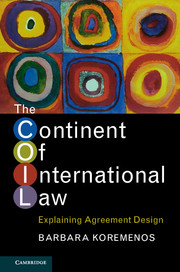Book contents
- Frontmatter
- Dedication
- Contents
- List of figures
- List of tables
- Acknowledgments
- 1 (Re)discovering the continent
- Part I COIL's building blocks: theory and data
- Part II Flexibility provisions in the design of international law
- 4 Duration provisions
- 5 Escape clauses and withdrawal clauses
- 6 (Im)precision and reservations
- Part III Centralization, scope, and control provisions in the design of international law
- Appendix 1 List of agreements in COIL sample
- Appendix 2 Coding rules
- Appendix 3 Selection issues in international cooperation data sets
- References
- Index
6 - (Im)precision and reservations
from Part II - Flexibility provisions in the design of international law
Published online by Cambridge University Press: 05 June 2016
- Frontmatter
- Dedication
- Contents
- List of figures
- List of tables
- Acknowledgments
- 1 (Re)discovering the continent
- Part I COIL's building blocks: theory and data
- Part II Flexibility provisions in the design of international law
- 4 Duration provisions
- 5 Escape clauses and withdrawal clauses
- 6 (Im)precision and reservations
- Part III Centralization, scope, and control provisions in the design of international law
- Appendix 1 List of agreements in COIL sample
- Appendix 2 Coding rules
- Appendix 3 Selection issues in international cooperation data sets
- References
- Index
Summary
[T]he United States has attached to each of its ratifications a “package” of reservations, understandings and declarations (RUDs) … As a result of those qualifications of its adherence, U.S. ratification has been described as specious, meretricious, [and] hypocritical [and confirmation] that United States adherence remains essentially empty.
(Henkin 1995b: 341, 346)This popularity [of the ICCPR and CEDAW] … has had a price: many of the ratifications have been accompanied by reservations that significantly reduce and in some cases effectively eliminate any obligations being assumed by the ratifying state.
(Schabas 1997: 110)This chapter considers two additional forms of flexibility: imprecision in the language used to describe an agreement's substantive terms and reservations added to agreements that allow states to opt-out of certain provisions. The COIL sample displays great variation on both of these dimensions.
In fact, the variation at first glance appears to be issue-area driven, with 32 percent of the human rights agreements having reservations attached to them at the time of entry into force as opposed to only 1 percent of the economics agreements. Moreover, only 2 percent of the economics sample can be characterized by very or somewhat vague language, whereas almost 40 percent of the human rights sample can. Do these descriptive statistics imply that human rights agreements are far less serious forms of international cooperation than are economics agreements, or even that human rights agreements are just scraps of paper or meaningless agreements, perhaps meant to placate an interest group, as some scholars like to argue?
In this chapter, I challenge the quotes that open this chapter, both of which engage the issue area of human rights, by providing a theoretical explanation for imprecision and reservations based on the underlying cooperation problems and the number of states involved in the cooperative endeavor. In doing so, not only can these two flexibility devices be understood as rational choices by states whose goal is indeed to cooperate, but the issue area of human rights loses much if not all of its explanatory power. Put differently, the design of human rights agreements can be explained within COIL's general theoretical framework.
- Type
- Chapter
- Information
- The Continent of International LawExplaining Agreement Design, pp. 158 - 192Publisher: Cambridge University PressPrint publication year: 2016



